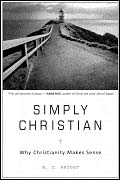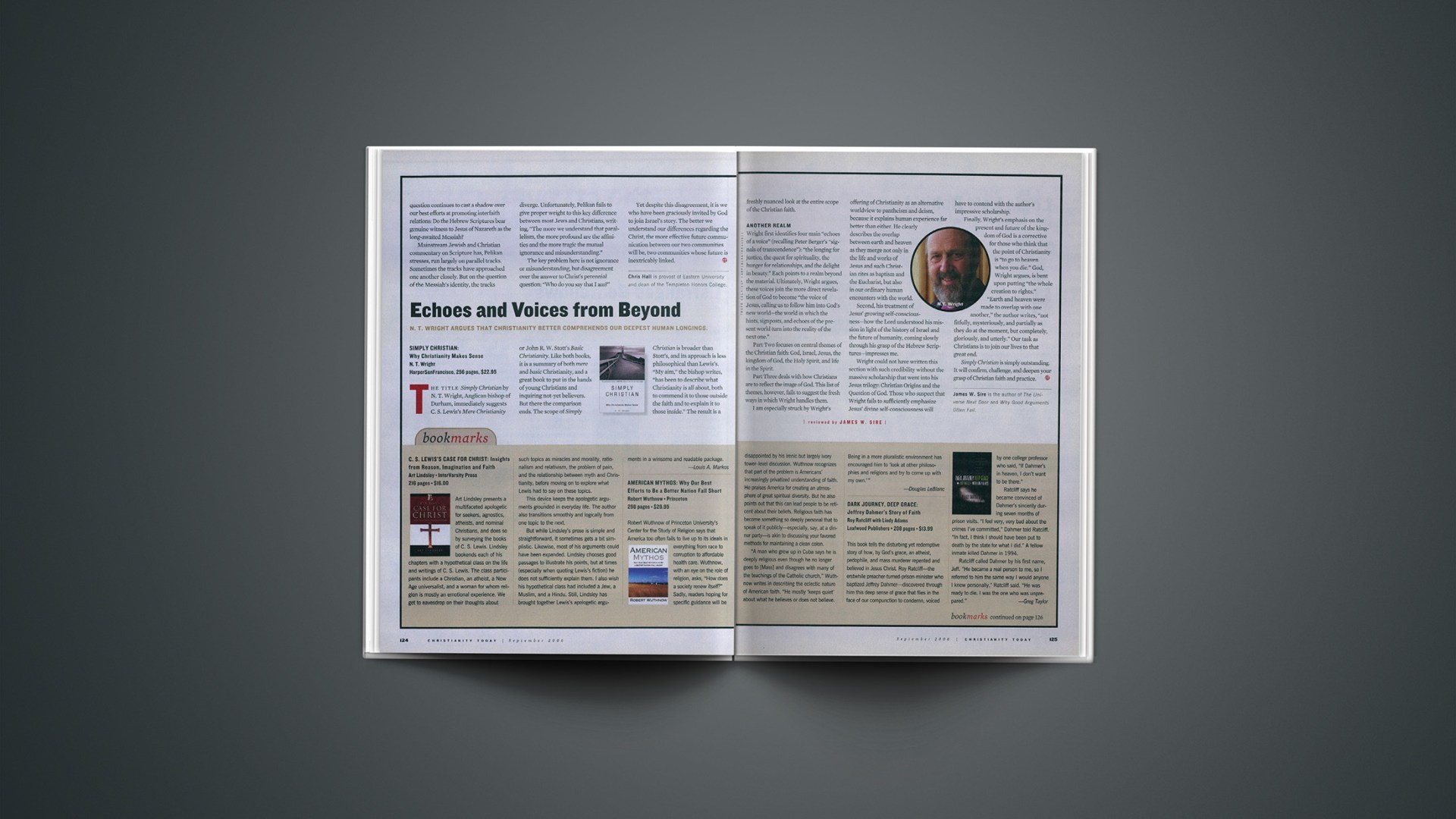The title Simply Christian by N. T. Wright, Anglican bishop of Durham, immediately suggests C. S. Lewis’s Mere Christianity or John R. W. Stott’s Basic Christianity. Like both books, it is a summary of both mere and basic Christianity, and a great book to put in the hands of young Christians and inquiring not-yet believers. But there the comparison ends. The scope of Simply Christian is broader than Stott’s, and its approach is less philosophical than Lewis’s. “My aim,” the bishop writes, “has been to describe what Christianity is all about, both to commend it to those outside the faith and to explain it to those inside.” The result is a freshly nuanced look at the entire scope of the Christian faith.
 SIMPLY CHRISTIAN: Why Christianity Makes Sense by N. T. Wright HarperSanFrancisco 256 pp.; $22.95 |
Another Realm
Wright first identifies four main “echoes of a voice” (recalling Peter Berger’s “signals of transcendence”): “the longing for justice, the quest for spirituality, the hunger for relationships, and the delight in beauty.” Each points to a realm beyond the material. Ultimately, Wright argues, these voices join the more direct revelation of God to become “the voice of Jesus, calling us to follow him into God’s new world—the world in which the hints, signposts, and echoes of the present world turn into the reality of the next one.”
Part Two focuses on central themes of the Christian faith: God, Israel, Jesus, the kingdom of God, the Holy Spirit, and life in the Spirit.
Part Three deals with how Christians are to reflect the image of God. This list of themes, however, fails to suggest the fresh ways in which Wright handles them.
I am especially struck by Wright’s offering of Christianity as an alternative worldview to pantheism and deism, because it explains human experience far better than either. He clearly describes the overlap between earth and heaven as they merge not only in the life and works of Jesus and such Christian rites as baptism and the Eucharist, but also in our ordinary human encounters with the world.
Second, his treatment of Jesus’ growing self-consciousness—how the Lord understood his mission in light of the history of Israel and the future of humanity, coming slowly through his grasp of the Hebrew Scriptures—impresses me.
Wright could not have written this section with such credibility without the massive scholarship that went into his Jesus trilogy: Christian Origins and the Question of God. Those who suspect that Wright fails to sufficiently emphasize Jesus’ divine self-consciousness will have to contend with the author’s impressive scholarship.
Finally, Wright’s emphasis on the present and future of the kingdom of God is a corrective for those who think that the point of Christianity is “to go to heaven when you die.” God, Wright argues, is bent upon putting “the whole creation to rights.” “Earth and heaven were made to overlap with one another,” the author writes, “not fitfully, mysteriously, and partially as they do at the moment, but completely, gloriously, and utterly.” Our task as Christians is to join our lives to that great end.
Simply Christian is simply outstanding. It will confirm, challenge, and deepen your grasp of Christian faith and practice.
James W. Sire is the author of The Universe Next Door and Why Good Arguments Often Fail.
Copyright © 2006 Christianity Today. Click for reprint information.
Related Elsewhere:
Simply Christian is available from Christianbook.com and other book retailers.
More information is available from HarperCollins.
More reviews and articles about N. T. Wright and his books include:
Editor’s Bookshelf: Life After Life After Death | The Resurrection of the Son of God is a “ground-clearing exercise” of historiographical obstacles. (April 17, 2003)
Editor’s Bookshelf: You Can’t Keep a Justified Man Down | An interview with N. T. Wright, author of The Resurrection of the Son of God. (April 17, 2003)
The Dick Staub Interview: Tom Wright Comments for Everyone | The author of the Christian Origins and the Question of God series is also writing a commentary series for the masses. (June 8, 2004)
An unofficial site dedicated to N. T. Wright is available at NTWrightPage.com.
For book lovers, our 2006 CT book awards are available online, along with our book awards for 2005, 2004, 2003, 2002, 2001, 2000, 1999, 1998, and 1997, as well as our Books of the Twentieth Century. For other coverage or reviews, see our Books archive and the weekly Books & Culture Corner.
Copyright © 2006 Christianity Today. Click for reprint information.










